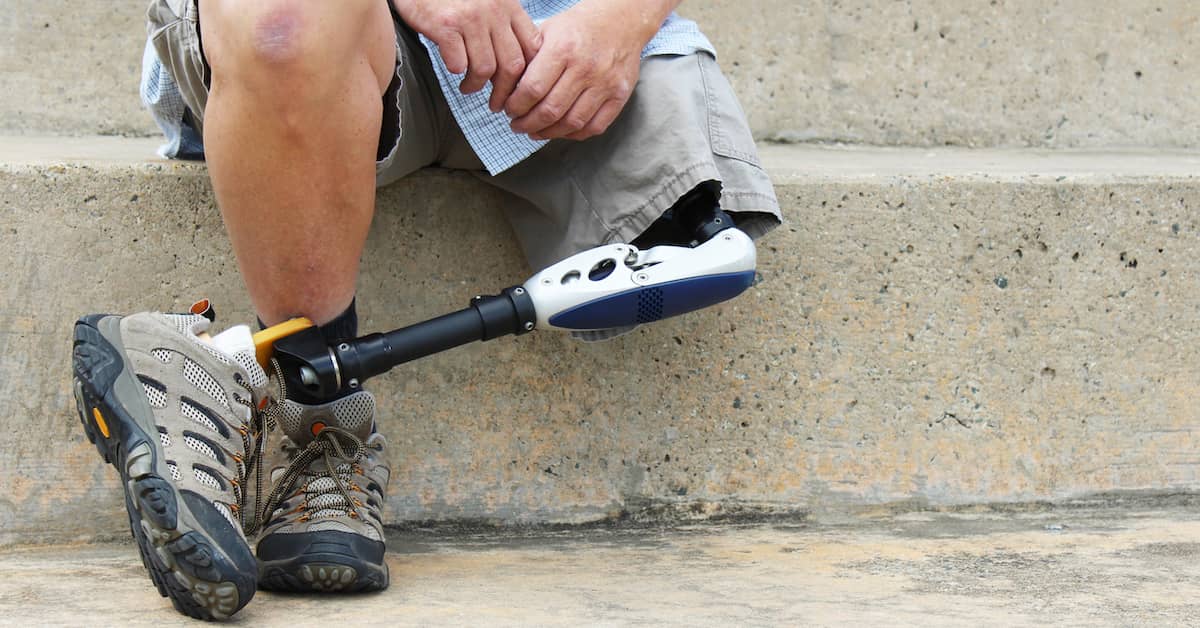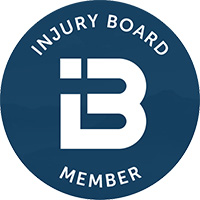
What Is Traumatic Amputation?
A traumatic amputation involves the removal of a limb or body part that occurs as the result of an accident or injury. Amputations can range from the loss of a single finger or toe to the loss of an entire arm or leg. In the United States, nearly 1.2 million people live with an amputation, and about 22 percent of amputations are caused by trauma.
The loss of a limb can forever change a person’s health, the quality of their life, and the ability to work. For 45 years, the amputation injury attorneys at Mandell, Boisclair & Mandell, Ltd have been helping injury victims throughout Providence and other areas of Rhode Island. We know the challenges faced by those who have experienced traumatic amputations, and we are committed to helping our clients pursue the maximum compensation they need to move forward.
What Are Complete and Partial Traumatic Amputations?
No two amputation injuries are exactly the same. In some cases, such as in a car accident, a limb may be immediately detached from the body. Other times, limbs can be irreparably damaged due to a crushing or burn accident.
Generally, amputations fall into two categories:
- Complete amputation: This type of amputation involves the total detachment of a limb from the rest of the body. In some complete amputation cases, surgeons can attempt to reattach a severed but preserved limb through “replantation surgery.”
- Incomplete amputation: These amputations occur when some of the soft tissues connecting the limb to the body remain intact. Partially severed limbs may or may not be reattached to the body. For example, limbs that are not completely severed but are still severely damaged may need to be removed through surgery.
In some cases, further surgery may be necessary to correct problems that develop or to help relieve pain.
Physical Effects of Traumatic Amputation
While traumatic amputations are serious and difficult injuries on their own, they can also lead to a number of other physical effects, such as:
- Mobility issues: Following an amputation, even the most basic aspects of daily life can become a challenge. Previously simple tasks around the house can become arduous, and it may become extremely difficult to perform job duties and earn a living.
- Infection: When the skin on a stump breaks down, it can cause wounds to open, potentially leading to infections and an increased risk of blood clots. Such infections often require additional surgery to remove more of the extremity or even the remainder of the limb.
- Phantom limb syndrome: This condition causes amputees to experience sensations, whether painful or otherwise, in limbs that do not exist.
Common Causes of Traumatic Amputation
Accidents that result in traumatic amputation are often devastating for victims and lead to a lifetime of disability. Traumatic amputations can result from a number of causes, the most common of which include:
- Motor vehicle accidents: One of the leading causes of traumatic amputations is motor vehicle accidents. These include car, truck, and motorcycle wrecks. The extreme force and speed of a collision can easily result in the loss of a limb or extremity. In traffic accidents, a traumatic amputation can involve the arms, legs, and more.
- Construction site accidents: Workplace accidents, particularly construction site accidents, cause numerous amputation injuries each year. Falls, equipment malfunctions, crushing accidents, and more can all result in the traumatic loss of a limb or body part.
- Firearms or explosive accidents: Accidents involving explosives, firearms, and fireworks account for many traumatic amputations. In some cases, even if the impact of an explosion did not cause the amputation, medical professionals may deem it medically necessary to amputate a body part that has been irrevocably destroyed by force or burn injuries.
- Defective products: Whether due to a malfunctioning auto part, gas grill, appliance, or other device, defective products cause many traumatic amputation injuries annually. These defects can be caused by flaws in the design, manufacturing, or warning labels of a product.
Rehabilitation after a traumatic amputation often involves a multidisciplinary approach, which may include:
- Physical therapy to strengthen limbs and improve mobility.
- Occupational therapy to relearn daily tasks and build independence.
- Prosthetic training for those who choose to use a prosthetic limb.
- Psychological counseling to address emotional trauma and adjust to changes.
Following the traumatic amputation of a limb, rehabilitation may span several months or even longer. The severity of the injury will influence your recovery process. So too will your age, lifestyle and health before the incident, and other factors unique to your situation. It is important to note that, even with rehabilitation, complete adaptation to limb loss is not always possible.
At Mandell, Boisclair & Mandell, we’ve worked with clients through every stage of the recovery journey. We understand the important role rehabilitation plays in recovering from limb amputation. We also know how expensive good care can be. When seeking compensation, we take into account both current and future expenses to make sure we are seeking the full compensation you deserve.
Recovering from and adapting to limb loss is a process that varies depending on the location of the amputation, the age of the injured individual, and the amount of post-injury support you are provided. Reaching maximum medical improvement—especially when prosthetics are involved—can take several months to years.
Equally important is your emotional recovery. Many people who have experienced amputation injuries deal with ongoing psychological effects such as PTSD or anxiety. These can require extensive counseling and, in many cases, lifelong medication and support.
Recovery and adaptation from limb loss are not linear. Setbacks can happen. When they do, having support—medically, emotionally, and financially—can make all the difference.
In some cases, a limb can be reattached following a traumatic amputation. However, reattachment is extremely rare and highly time-sensitive.
Known as limb replantation, the procedure requires:
- Quick preservation of the severed limb
- Clean amputation with minimal tissue damage
- Availability of a specialized surgical team
Even when technically possible, reattachment does not always restore full function. The long-term success of limb replantation depends on factors like nerve damage, infection risks, and your body’s response to both limb loss and major surgery.
Limb replantation is not always successful.
At Mandell, Boisclair & Mandell, our Providence amputation injury lawyers understand how frightening and difficult it can be to face the loss of a limb. We will fight for the compensation you need to address all of the damages resulting from your accident to help you make the best recovery possible, no matter if that’s with a reattached limb, prosthetic, an assistive device, or ongoing medical care.
When traumatic amputation is the result of someone else’s negligence, you can seek compensation through a personal injury lawsuit. If your amputation was due to medical error, you can seek compensation through a medical malpractice lawsuit. Through legal action, you may be able to obtain compensation for:
- Past and future medical expenses
- Lost wages and earning capacity
- Home and vehicle modifications
- Assistive technologies
- Pain and suffering
- Emotional distress
- Loss of enjoyment in life
- Disfigurement
In wrongful death cases resulting from an amputation, surviving family members may be entitled to seek damages for end-of-life expenses, lost future income, and more.
Every dollar matters when you’re rebuilding your life. The Providence amputation injury attorneys at our firm take time to carefully evaluate the specific damages available and applicable for every case. We will leave no category of loss unexamined and make sure the full impact of your injury is recognized.
Yes! Prosthetics—and the long-term, recurring costs associated with them—should absolutely be part of a comprehensive legal claim. Prosthetics are not a one-time purchase. Devices need to be replaced and upgraded regularly, with an average replacement interval of three to five years. Custom and activity-specific prosthetics or those with electronic components can cost tens of thousands of dollars.
When considering compensation for prosthetic devices, it is important to bear in mind the costs of:
- Prostheses fitting
- Future replacements
- Repairs and maintenance
- Prostheses training
- Additional mobility aids
When it comes to traumatic amputation, all potential expenses, in the immediate and long-term future, must be factored into your personal injury claim. Legal action can help maximize your compensation, ensuring it covers not just the cost of future prosthetic devices, but all of the expenses associated with frequent upgrading as well.
At Mandell, Boisclair & Mandell, we work with medical and economic experts to calculate the true cost of your injury, including any prosthetic devices that can assist you in living a better life. During your cost- and obligation-free consultation, we can discuss your expenses to help you determine what your claim may be worth.
Traumatic amputations are among the most devastating and life-altering injuries a person can experience. These cases involve lifelong medical care, disability accommodations, lost earnings, and emotional trauma—all of which require a law firm with deep experience in catastrophic injury litigation.
Mandell, Boisclair & Mandell, recognized as one of the Best Law Firms in America, has recovered millions of dollars in settlements and verdicts for our clients. We are known for our:
- Decades of combined experience
- History of handling complex injury claims
- Proven approach to case building
- Personal and uncompromising representation
Our Providence amputation injury lawyers don’t just work for a quick settlement, we fight for justice, accountability, and a financial recovery that truly reflects what you’ve lost. Contact us for free to learn more.
Contact a Traumatic Amputation Lawyer in Providence Today
The lawyers at Mandell, Boisclair & Mandell, Ltd are passionate about helping accident victims recover from their injuries and move forward in their lives with dignity. If you have experienced a traumatic amputation due to someone else’s negligence, we want to hear your story.
View our multi-million-dollar settlements and trial results.
Call us today at (401) 273-8330 for a free case evaluation. Mandell, Boisclair & Mandell, Ltd serves clients throughout Rhode Island, including Providence and other nearby areas.






























